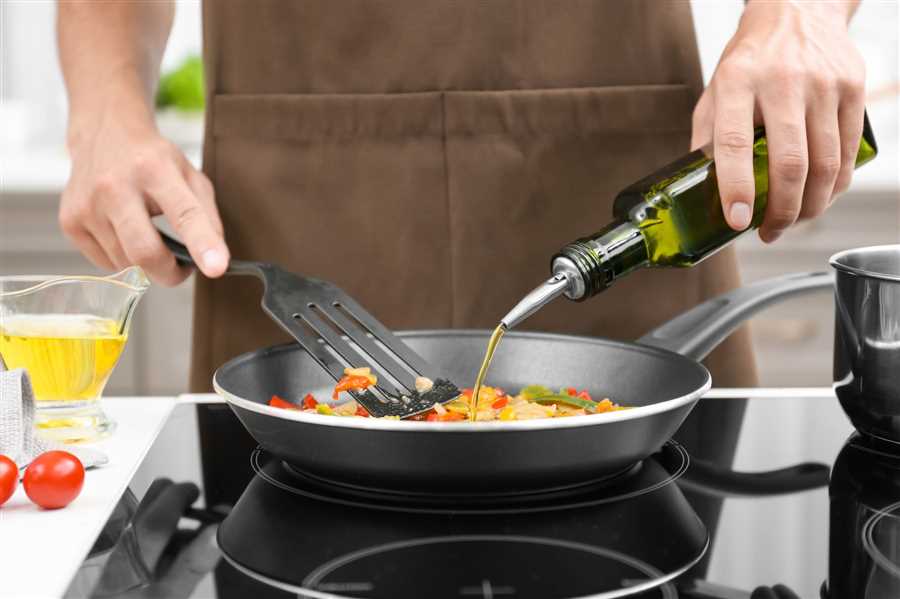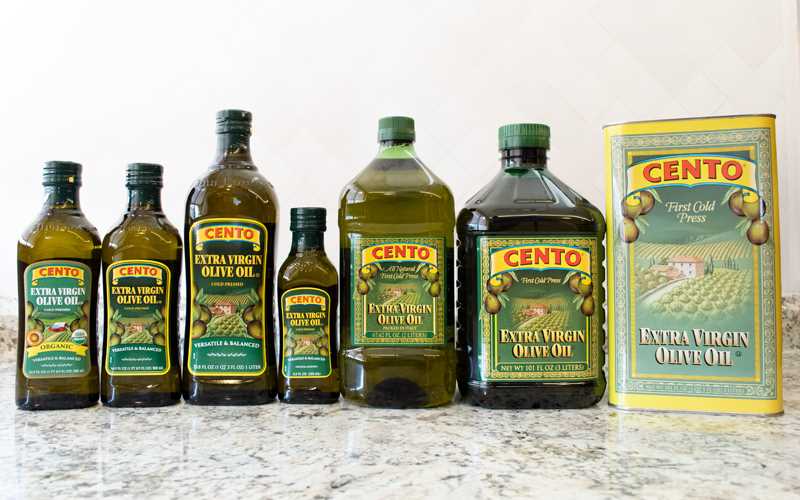


Extra virgin olive oil is often hailed as one of the healthiest types of oil, known for its rich flavor and numerous health benefits. However, there has been some confusion about whether it is suitable for cooking.
Many people believe that heating extra virgin olive oil can cause it to lose its nutritional value and develop harmful compounds. On the other hand, some argue that its high smoke point makes it safe for cooking at high temperatures.
So, can you use extra virgin olive oil for cooking? The answer is… it depends.
The smoke point and quality of the oil play a crucial role in determining whether it can withstand the heat of cooking without breaking down and becoming harmful.
Extra virgin olive oil generally has a lower smoke point compared to other oils, around 375°F (190°C) depending on the quality and freshness.
However, it can still be used for light sautéing, stir-frying, and baking at moderate temperatures.
It is important to keep in mind that if the oil starts to smoke, it has reached its smoke point and should not be used for cooking. Using an oil with a smoke point that is too low can lead to the formation of harmful compounds and a burnt or off-flavor in your food.
Is it Safe to Use Extra Virgin Olive Oil for Cooking?
Extra virgin olive oil is a popular choice for many people when it comes to cooking. It is known for its health benefits and rich flavor. However, there is some debate about whether it is safe to use extra virgin olive oil for cooking.
Some believe that the high smoke point of extra virgin olive oil makes it suitable for high-heat cooking methods such as frying and grilling. Its ability to withstand high temperatures without breaking down can make it a good option for these types of cooking. However, it is important to note that the smoke point of extra virgin olive oil can vary depending on the quality and origin of the oil.
Others argue that extra virgin olive oil is best used for low to medium-heat cooking or as a finishing oil. This is because extra virgin olive oil has a low smoke point compared to other cooking oils such as canola or vegetable oil. When heated above its smoke point, the oil can begin to break down, lose its nutritional value, and develop a bitter taste.
Benefits of Cooking with Extra Virgin Olive Oil
One of the main advantages of using extra virgin olive oil for cooking is its health benefits. Extra virgin olive oil is rich in monounsaturated fats and antioxidants, which are believed to have numerous health benefits, including reducing the risk of heart disease and inflammation.
In addition to its health benefits, extra virgin olive oil adds a unique and delicious flavor to dishes. It is commonly used in Mediterranean cuisine and can enhance the taste of salads, pasta, and grilled vegetables.
Tips for Cooking with Extra Virgin Olive Oil
If you choose to use extra virgin olive oil for cooking, there are a few tips to keep in mind:
| 1. | Use a lower heat setting: | Extra virgin olive oil has a lower smoke point, so it’s important to use a lower heat setting to avoid the oil from reaching its smoke point and breaking down. |
| 2. | Limit the cooking time: | Using extra virgin olive oil for shorter cooking times reduces the chances of it breaking down and losing its nutritional value. |
| 3. | Consider using it as a finishing oil: | If you prefer to use extra virgin olive oil for its distinctive flavor, consider adding it to dishes as a finishing oil, drizzling it on top just before serving. |
In conclusion, while there is some debate about using extra virgin olive oil for cooking, it can be a safe and healthy option when used correctly. As with any oil, it’s important to be mindful of its smoke point and use it in appropriate cooking methods to fully enjoy its flavor and health benefits.
The Popularity of Extra Virgin Olive Oil
Extra virgin olive oil has become increasingly popular in recent years. Not only is it a staple in Mediterranean cuisine, but it is also widely used in kitchens around the world.
One of the reasons for its popularity is its health benefits. Extra virgin olive oil is rich in monounsaturated fats, which are considered to be healthy fats. It is also high in antioxidants, vitamins, and minerals, making it a nutritious choice for cooking.
In addition to its health benefits, extra virgin olive oil is known for its distinctive flavor. Its fruity and peppery taste adds depth to dishes and can enhance the overall dining experience. It is often used in salad dressings, marinades, and sauces, bringing out the flavors of other ingredients.
Furthermore, extra virgin olive oil is versatile and can be used for a variety of cooking methods. It has a high smoke point, which means it can be heated at higher temperatures without breaking down, making it suitable for sautéing, frying, and roasting. Its mild flavor also makes it a great choice for drizzling over cooked dishes or using as a finishing oil.
With its numerous health benefits, distinctive flavor, and versatility in cooking, it is no wonder that extra virgin olive oil has gained such popularity in culinary circles. Whether you are a professional chef or a home cook, it is a must-have ingredient in the kitchen.
Nutritional Benefits of Extra Virgin Olive Oil
Extra virgin olive oil is not only a delicious and versatile cooking ingredient, but it also offers numerous health benefits. This Mediterranean staple is rich in monounsaturated fats, which are considered heart-healthy and can help lower bad cholesterol levels.
In addition to healthy fats, extra virgin olive oil contains antioxidants such as vitamin E and polyphenols. These compounds have been shown to have anti-inflammatory properties and may help protect against oxidative stress in the body.
Extra virgin olive oil is also a good source of vitamin K, which plays a key role in blood clotting and bone health. It also contains small amounts of vitamins A and D, as well as various minerals like calcium and potassium.
Regular consumption of extra virgin olive oil has been associated with several health benefits. Research suggests that it may help reduce the risk of chronic diseases such as heart disease, stroke, and certain types of cancer. It may also have a positive effect on brain function, as it is rich in antioxidants that can help protect brain cells from damage.
When using extra virgin olive oil for cooking, it is important to keep in mind that it has a low smoke point. This means that it is best suited for low to medium heat cooking methods such as sautéing, roasting, and dressing salads. Using it in high heat cooking methods may cause it to break down and lose some of its beneficial properties.
Overall, incorporating extra virgin olive oil into your diet can be a simple and tasty way to boost your intake of healthy fats, antioxidants, and essential nutrients. Whether you’re drizzling it over a salad or using it for cooking, this versatile oil can provide a range of nutritional benefits.
Smoke Point of Extra Virgin Olive Oil

Extra virgin olive oil is a popular and widely used cooking oil. It is known for its numerous health benefits and rich flavor. However, it is important to note that extra virgin olive oil has a relatively low smoke point compared to other cooking oils.
The smoke point refers to the temperature at which an oil begins to break down and produce smoke. When oil reaches its smoke point, it starts to degrade, releasing harmful compounds and losing its nutritional value. Beyond its smoke point, the oil can become bitter in taste and can even become harmful to consume.
The smoke point of extra virgin olive oil is around 375°F (190°C). This makes it suitable for low to medium heat cooking methods such as sautéing, stir-frying, and baking. It is not recommended to use extra virgin olive oil for high heat cooking techniques like deep frying or searing, as the oil may smoke and burn.
It is important to note that not all extra virgin olive oils are created equal. The smoke point can vary depending on factors such as the quality and purity of the oil, as well as its processing methods. Generally, extra virgin olive oils with lower acidity levels have higher smoke points.
When using extra virgin olive oil for cooking, it is best to monitor and control the heat to prevent the oil from reaching its smoke point. It is also advisable to use other cooking oils with higher smoke points for high heat cooking methods.
In conclusion, while extra virgin olive oil is a healthy and flavorful option for cooking, it is important to be mindful of its smoke point and use it appropriately to avoid compromising its quality and taste.
Health Considerations

Extra virgin olive oil is considered one of the healthiest cooking oils available. It is rich in monounsaturated fats, which are known to promote heart health by reducing levels of LDL cholesterol and increasing levels of HDL cholesterol. These healthy fats can help combat inflammation and oxidative stress in the body.
Additionally, extra virgin olive oil is a good source of antioxidants, particularly vitamin E, which can protect the body against oxidative damage. These antioxidants have been linked to a reduced risk of chronic diseases such as heart disease and certain types of cancer.
When using extra virgin olive oil for cooking, it is important to keep in mind that it has a low smoke point compared to other cooking oils. Heating it to high temperatures can cause the oil to break down and lose its beneficial properties. It is best to use extra virgin olive oil for lower to medium heat cooking methods such as sautéing, baking, and light frying.
Overall, incorporating extra virgin olive oil into your cooking can be a healthy choice. However, it is always recommended to consume it in moderation as part of a balanced diet that includes a variety of other healthy fats and oils.
Questions and answers
Is it possible to use extra virgin olive oil for cooking?
Yes, extra virgin olive oil can be used for cooking. It has a low smoke point, so it is best for low to medium-heat cooking methods such as sautéing, stir-frying, and baking.
What is the smoke point of extra virgin olive oil?
The smoke point of extra virgin olive oil is around 375°F (190°C). Cooking at temperatures higher than this can cause the oil to break down and produce smoke and unpleasant flavors.
Can I fry food with extra virgin olive oil?
While extra virgin olive oil can be used for frying, it is not the best choice due to its low smoke point. It is better suited for light frying or sautéing rather than deep frying.
What are the benefits of using extra virgin olive oil in cooking?
Using extra virgin olive oil in cooking can provide several health benefits. It is rich in monounsaturated fats, which are considered heart-healthy. It also contains antioxidants and anti-inflammatory properties. Additionally, it adds a unique flavor to dishes.
Can I substitute extra virgin olive oil with another type of oil for cooking?
Yes, if you don’t have extra virgin olive oil, you can substitute it with other types of cooking oils such as canola oil, vegetable oil, or sunflower oil. These oils have higher smoke points and are more suitable for high-heat cooking methods.






